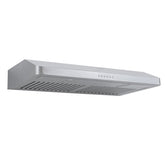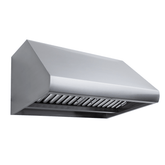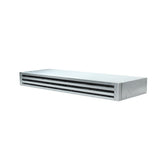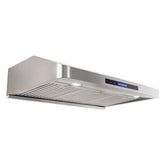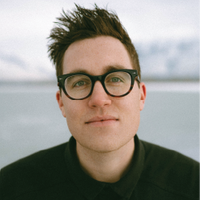Are you ready to break out your grill? During the grilling season, it’s important to be aware of all the safety precautions so you can grill safely and comfortably. You’ll have peace of mind knowing you can keep your friends, family, and guests safe in case of an emergency.
Here are 16 grilling safety tips to follow this summer.
Clean your grill every few weeks.
Over time, your grill will accumulate heavy grease as you cook. This grease is highly combustible and too much of it can quickly cause fires. So, clean your grill regularly to keep the grease buildup down.
How often you clean your grill depends on your cooking style. Every three weeks works for most homeowners – if you cook about two or three times a week in your outdoor kitchen. If you cook four to five times a week, you may want to clean your grill every week. Put it on your calendar so you don’t forget. It only takes a few minutes. You can check out our guide on how to clean a gas grill here!
After big cookouts where you cooked for several hours, clean your grill thoroughly. If you notice that fires start easily while you’re grilling, you may need to give it a quick clean!
Leak test your grill every year – or if you smell gas.
With propane grills, the best practice is to leak test them every year. The process is pretty simple. You brush dish soap and water on the connections to the tank and the gas line. Then, turn on the gas. If you notice bubbles, you have a gas leak.
At that point, turn off the gas and tighten the connections to your propane tank. Wait five to 10 minutes for the gas to dissipate then test the grill again.
Here is a short video from the National Fire Protection Association showing you how it’s done.
Don’t wear loose clothing.
Clothing catching on fire may seem like a freak accident. You might think, ‘That won’t happen to me!’ But it’s more common than you might think. It also often goes unnoticed. You won’t know your clothing has caught fire until it’s too late! Wear tight fit clothing to avoid all that trouble. If you have long hair, put it up before grilling. It’s safe and sanitary. You don’t want your hair to catch on fire or hair in your food!
If you need to take off any loose clothing or jackets, don’t set it close to the grill. It could catch on fire if left unattended for too long.
Invest in grilling gloves and the right cooking utensils.
Grills produce incredible heat, so the right utensils and gear go a long way. If you’ll be handling hot pans or food, invest in a pair of grilling gloves. Here’s a high-quality pair from Amazon. These gloves are perfect if you cook with cast iron pans on the grill.
But, if you can avoid handling food directly on the grill, that’s best. Invest in some tongs or other grilling utensils to move hot food on the grill. Every cook needs a good spatula too – learn more about some of the best spatulas for grilling at this link.
Have baking soda and a fire extinguisher on hand.
Grills get as hot as an oven, so you want to have everything you need to keep fires at bay. As the saying goes, it’s better to be safe than sorry. So buy some baking soda and store it near your grill station in case of a fire. Keep a fire extinguisher close by if the fire is difficult to contain.
When putting out a cooking fire, never use water as it can help spread the fire. It also might splash the hot grease, oil, or coals around which is dangerous.
Learn all about how to put out a grease fire in your kitchen at this link.
Install your grill away from combustibles or wooden structures.

Keep your grill at least three feet away from deck railings, wooden structures, or combustible materials. Residual heat from the grill can damage these structures or cause combustibles to ignite. Even if you don’t grill often, follow this rule. Every time anyone uses their grill, it has to be preheated. And this takes time! So it’s vital to reduce the risk of a cooking fire as much as possible.
Install your grill on a flat and stable surface.
This may be self-explanatory. But installing your grill on a flat surface will make your life easier in the kitchen. If your grill falls over, you’ll not only have a mess but could also get burned.
So, make sure the ground is level when deciding where to put your barbecue grill. If it’s not, find a different location. Don’t try to cheat with this safety tip.
If your grill has wheels, lock them once you’ve decided on the perfect spot. You don’t want your grill to move with the slightest nudge.
Clean your grill before cooking different food groups.
You may have heard that you shouldn’t prepare raw meat on the same cutting board as other foods like vegetables or fruits. Well, the same goes for grills. Raw meat or poultry can carry some nasty bacteria and diseases. So make sure you grill it separately from other foods. You can also designate one area for raw meat and one area for other food if you want to cook them at the same time. Otherwise, clean the grill thoroughly in between uses.
If your grill doesn't light, wait five minutes before lighting it again.
Sometimes, for whatever reason, your grill won’t light immediately. Instead of letting it run for minutes, turn the gas off after about 20 seconds. If there’s a strong scent of gas, it’s been on for too long. Let the gas dissipate for five minutes for your safety before lighting it again. If you don’t let the gas dissipate, you could cause a flare-up.
With any gas grills, open the lid before lighting.
With the lid closed, gas will accumulate fast in a small area. If you let that gas build up and it ignites, flare-ups can occur. Always open the lid before lighting so the gas dissipates more quickly.
Always supervise your grill when it’s running.

Babysit your meats – or any other food you have on the grill. It’s so easy to step inside and get distracted doing something. Next thing you know, your whole patio is smoking and your food is burnt to a crisp. So, give cooking your undivided attention.
Don’t crowd the grill.
Crowding the grill can make your food greasy. Not to mention it may cook unevenly. Leave at least an inch or two of space between your meats and don’t cook too many at the same time. That way you can keep the grease and smoke down.
Keep children and pets away from the grill when it’s running.
Gas and propane grills can typically reach up to 550º F., while charcoal grills can get up to 700º F. So it’s important to keep pets and children away. Hopefully you’ll be supervising the grill while it’s running. But just in case, let your kids know to stay away from the grill.
Avoid using lighter fluid if possible.
Lighter fluid works well in a pinch to light your charcoal grill. But it’s highly combustible and can be dangerous. Flare-ups can occur and it’s easy to lose control of the grill if you use too much. Never add lighter fluid to a burning fire. Instead of lighter fluid, you can use newspaper and a chimney starter to light your coals. It’s much safer and easier to contain.
Don’t forget to wear your grilling gloves. They’ll come in handy when working with your chimney starter.
Turn off your grill after use.
This one is pretty self-explanatory, but it’s good to have a reminder. When preparing food, it’s easy to get distracted. Especially if you’re mid-conversation or have a group of eager guests waiting for you. But it’s vital to do a thorough check of your cooking area once you’re done in the kitchen.
Is the grill turned off? Are all combustible materials away from the grill? Did you brush the grill thoroughly? Unattended cooking equipment is one of the leading causes of cooking fires. Read more about that in this article along with some helpful safety tips.
Buy a meat thermometer to avoid undercooking meats.
A meat thermometer is a must-have in your kitchen, especially for inexperienced cooks. According to the U.S Department of Agriculture (USDA), the safe temperature for beef is 145º F. with a three-minute rest time. Ground meats should be cooked to 160º F. without rest time. Poultry products should be cooked to 165º.
Always check the temperature of your meat before you think it’s done. You can always cook the meat for longer. When checking the temperature, avoid bone so that you can get an accurate measurement.
Frequently Asked Questions
Can I grill in the rain?
Yes, but keep in mind it may require more time to preheat fully. Keep the lid closed as often as possible. You don’t want heavy rain to get inside the grill. To learn more about grilling in the rain, check out our post ‘Can I grill in the rain?’
Can I grill in the garage?
It’s not recommended to grill in the garage without a powerful outdoor range hood. In garages and other enclosed areas, you’re at a higher risk of fire compared to an open outdoor patio. Propane tanks are highly combustible so it’s best to keep those in open outdoor areas. Learn more in our post.
What are four grilling safety guidelines?
- Don’t leave your grill unattended.
- Clean your grill every few weeks.
- Install your grill away from combustibles and wooden structures.
- Have baking soda and a fire extinguisher on hand.
Is it safe to grill in hot weather?
Yes, it is safe to grill in hot weather. Just make sure you stay cool and hydrated. If you can grill under an outdoor cover like a pergola or awning, that’ll provide you with some much needed shade. Learn more about the best patio covers for your outdoor space at this link.
Related Articles
12 Patio Heater Safety Tips You Should Know
Can I grill in the rain? (Explained)
Can I grill in my garage? (Explained)
